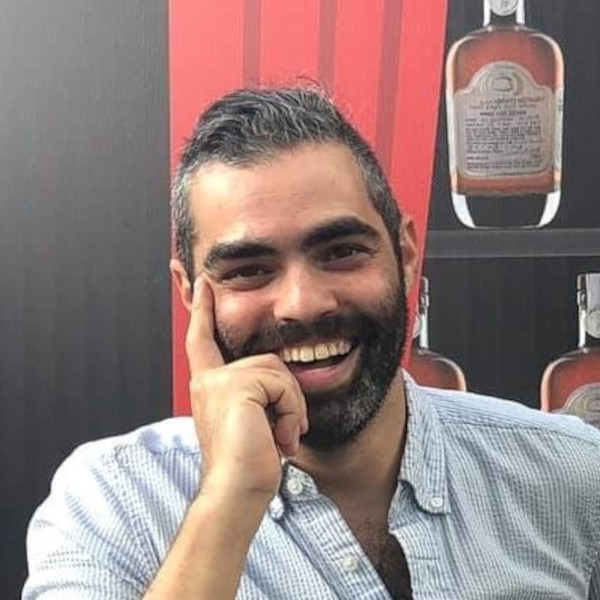Interviews with Olim
Each month, we interview an oleh or olah for our newsletter.
We invite you to read the stories of LGBTQ+ people who have made Israel their home.
"A belonging that I still don't feel in America"
Interview date: July 2019
Q. Where were you born and where did you grow up?
A. Born and raised in Washington, DC (the actual city, not the suburbs), NYU for undergraduate degree.
Q. At what age did you come out? And how did it go?
A. I have known for a long time that I am attracted to men, and so have others — or at least they knew the word and words for it as far back as the 3rd Grade, while I didn’t. I knew I was queer in the word’s sense of being a contrarian and entirely different, not just its sexual connotation, and so I thought it to be a phase until that someone — anyone — came along. Until then, I thought, let them talk about me, I’m too busy walking to my own synth beat to care. Only in the past few years have I made it publicly known, having gotten older and slightly wiser, and understanding that by not sharing this one part of my life I risk not getting to share the rest of it with someone.
Q. Were you involved at all in the LGBT community back home?
A. Nope. I couldn’t find myself nor wanted such an open expression, as I wanted to be known for what I have created and accomplished, as we should all be, instead of who I am inherently.
Q. What is your involvement (if any) in the LGBT community in Israel?
A. I volunteer with IGY (Israel’s national LGBTQ youth organization), I teach introductory Hebrew with Qulpan, and I’m part of a new initiative called Mother Has Arrived to create & promote global LGBT+ culture.
Q. How long since you made Aliyah?
A. August 2006, nearly 13 years (!)
Q. Did you move here on your own or with family/friends/significant other?
A. I’m a fourth-generation American on both sides, and all of my biological family is in the USA to stay. My closest friends from university all made Aliyah within a short span of my own arrival, becoming family as much as remaining friends.
Q. Why did you make Aliyah?
A. Short answer, Zionism. I didn’t grow up in a Zionist home, and my first time in Israel at age 18 was not love at first sight. It took years of coming back and making personal connections to the country and the people to feel connected. I’ve always been culturally more Eurocentric than American; between that, and the default look here is more like me — slim, dark-skinned, hairy — helped create a belonging that I still don’t feel in America.
I understand it to be the only means to articulate the inherent communal and national aspect of what it means to be a Jew. Even if I were to move back to the USA or elsewhere, carrying the Israeli passport and paying into National Insurance forever connects me to both the country and my Jewish identity in a way that can’t be replicated in any other context. For someone who aspires to travel a lot more than I currently do, I love that becoming an Israeli citizen is to be part of the world’s first example of globalization.
Q. How is it going so far?
A. 13 years, and still here! The longer I’m here, and I hear this from fellow Anglos, the more Israeli I am when in the USA and the more American I am here. That actually drives me more to stay, as I’ve come to understand that the part of the American Dream where you can manifest your passions is not only viable here – it’s needed. There’s still so much left to do here, and it’s exciting to actively make oneself a part of that process. Leading by personal example is one of the cheapest ways to create change, be it by thanking someone or dressing up and thus showing respect to oneself and others.
Q. What do you do in terms of work?
A. I’m self-employed, helping entrepreneurs and small businesses from all sectors with their international communications – marketing, PR, pitching, branding, tailoring, cross-cultural challenges, and more – in order to get the global exposure they deserve to make their visions grow. My company’s name is Ḥayyati, transliterated from Hebrew as “My Tailor” and from Arabic as “My Life”, which not only reflects Israel’s two official languages, but the nexus at which I sit to help others in Israel and around the world. I’ve always worked in complicated employment situations, always in the fields of Cultural Diplomacy and Israel-International Relations, and always being drawn to empowering emerging voices and promoting a nuanced yet accessible relationship with Israel.
Q. How is your Ivrit?
A. I’d say 90-95% fluent. I’m a fast language learner, I came to Israel already being proficient, and I volunteer teach Introductory Hebrew with LGBT Olim’s Qulpan and with Nefesh b’Nefesh – it’s important to me that fellow Anglos, who are highly educated and accustomed to a certain standard of living, are able to advocate for themselves and not fall back on ‘Doesn’t everyone speak English?’ as an excuse not to learn the language – *our* language. That being said, mine could always be better, especially in the areas of reading longer articles and literature, and having more personal conversations when on dates.
Q. What has been your biggest challenge so far?
A. Feeling financially stable remains the biggest one here. I know people who are more secure, but most of them had to turn to less-fulfilling jobs to secure that, and I can’t imagine doing that. 13 years as a full-time Israeli and a professional career stretching back to university, and in many ways I’m still paying dues in order to advance. One of the many lessons I’ve learned here in Israel is that life is a lot longer than we give it credit – that doesn’t give us a mandate to go too slow, but it does allow us to live life much more optimistically and slowly. That being said, a proper vacation does sound really nice.
Q. How do you perceive the Israeli LGBT community?
A. A lot of infighting, a lot of ego, a lot of projection of one’s own issues onto others – feels like home! We’re lacking public spaces that fall between the extremes of politics on one side and circuit parties on the other. Much like Zionism, which treads a fine line between normalization and particularism for Jews in a global context, we need the same for LGBT+ Israelis of all backgrounds in Israel. That neither means forming our own political party nor ‘gay villages,’ like in other cities around the world. I’d love to see the same energy that fuels all the infighting and working through self-esteem issues by taking the perfect selfie to be applied to creating a more varied society. In the meantime, there’s always leading by personal example, which I try to do.
Q. How is being LGBT in Israel different to back home?
A. I’d say it’s the same as being an immigrant here in Israel — I can strike up a sparkling conversation on a date back in the USA, but there will always be something missing Jewish and/or Israel-wise in it; and I can do the same here in Israel, but unless it’s with someone who’s also an immigrant or spent a significant time abroad, there will always be a disconnect. Dwelling on those parallels can be paralyzing, or they can be liberating in finding self-awareness through them.
Q. If you were making aliyah now, would you do anything differently?
A. I’d have gotten my Driver’s License in the USA, as there’s a lot more exploring to do in this country that public transportation just can’t reach. That being said, life is not about regrets but about moving on and up — and I make for a great navigator and travel companion.
Jay

Our Newsletter
Sign up if you would like to receive a monthly email listing events of interest to LGBT English-speakers in Israel, an interview with an oleh/olah and other useful information.
Want to be interviewed?
Complete the form below and we will get back to you.
Our Newsletter
Sign up if you would like to receive a monthly email listing events of interest to LGBT English-speakers in Israel, an interview with an oleh/olah and other useful information.
Want to be interviewed?
Complete the form below and we will get back to you.


